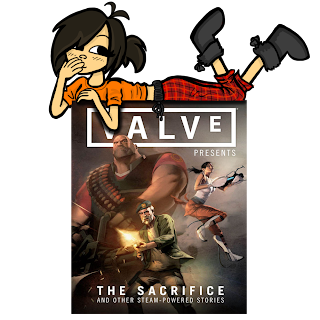Title: Games of Empire: Global Capitalism and Video Games
Publisher: University of Minnesota Press
Publisher: University of Minnesota Press
Authors: Nick Dyer-Witheford and Greig de Peuter
Published: 08/12/2009
Page Count: 320 pages
Final Verdict: 8/10
I drew the header for this review almost as soon as I started reading it... a few months ago. I instantly thought a plain grey suit and a groomed look was perfect, and I immediately associated this book to an annual business meeting. So... ahem. *Straightens out jacket*
This book is a little bit of a tease. It's a little harmless-looking paperback book. It fits in my purse. I got through 2 books of that size in a DAY. Then why did it take me a couple MONTHS to get through it? A look at the publisher will give an important hint.. The University of Minnesota Press. The book just rings of doctoral essay.
The first hint of that is that it holds up an incredibly high standard in language language level. I blame many of my delays due to the fact that I couldn't read this book adequately without my laptop within inches of me to be able to Google these references and define these words that I've never even heard of every few moments. I appreciate this as I'm always looking to expand my vocabulary and as I wouldn't want to compromise the integrity of the book by having it dumbed down to my level but it's something that will play a certain role in selling this book to a more casual reader.
I expected this book to talk about numbers and statistics and very hum-drum facts and points about the economic power of the video game industry. Boy, was I wrong. Global capitalism isn't just about income and moulah and recessions. The book goes into many sociological discussions as well as dealing with global history lessons and psychological questions. It explores a ton of different fields of interest and there's a great variety of facts that all finds way to relate with and stay pertinent with the subject of video games' impact on global capitalism. The entire book had me fascinated with the facts that were being presented and the unusual perspective it took on the video game industry. It's a refreshing outsider look, differing from the die-hard fan rants and the cynical critic, this is a fresh look at a fresh angle, which brings me to my next point.
I appreciated the unbiased positions the authors take up. This book is a wonderful reference as it doesn't preach. It presents the facts, both positive and negative, about all that there is to know about the role games play in the world's economy and dynamic. Your own opinions can be formed after you've taken in the massive amount of information presented or just have your curiosity peaked to search more in depth in one particular branch. Regardless, the information is really well presented, properly worded, and elegantly delivered. I can't guarantee I understood everything, I did have to re-read sections and educate myself a little bit with some research as I have no business or economics background which made some of the terminology used a little overwhelming and forced me to dig deeper, which in turn again helped me discover a whole new world of information.
ALTHOUGH. There's one small (really stupid!) issue that really drove me up the wall. I don't actually know if that's the proper essay format, or whatever you consider what this book is, but damnn. This essay quotes a LOT of references which makes it really feel formal and there's a certain strength about having facts and references backing up your writing, but the sheer amount of reference information in parentheses directly following the sentence it was used for GREATLY impairs the flow of the book. It gets hard to follow a trait of thought when it's constantly interrupted with potentially meaningless names or numbers (my brain, p.150-151, 26/04/2012) It might sound like a stupid complaint but it can really make it hard to grasp the meaning of a paragraph (myself, 1, 2, 3, 69) when it's all split sentence by sentence (according to my mind, p.11) or even every few words. (2012, just now) Know what I mean? It gets hard to understand with the mix of a higher grade of language and the constant interruptions by the resource's information. To make it all worse, there's about 20 pages of footnotes and definitions that are incredibly hard to directly link it's specific section in the book, even with all the little symbols and notes. I guess I need a university student or prof to tell me my feelings towards this format are simply misguided or immature, but I did not find it very user friendly.
Overall, really, it took me ages to read. It was hard. It was like studying, but I still pushed through it because of the sheer fascination I had with everything it presented me. It really covered all the bases it promised to cover. It was very thorough, professional and taught me more then one new lesson. It expanded my universe of gaming knowledge to a whole new level, and I'm really grateful for that. I give it 8 head shots out of 10 as it's complexity is at the same time it's greatest aspect and it's biggest downfall.












